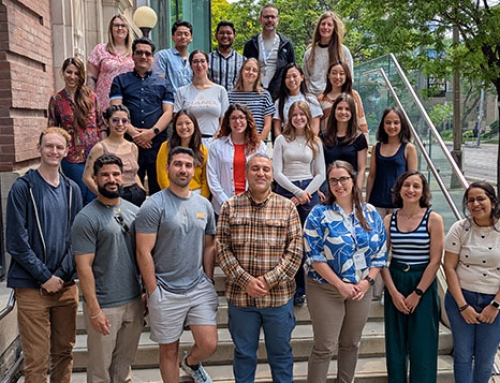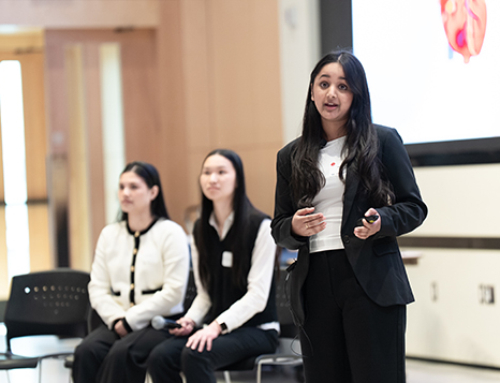
Justine Bajohr (right) presents at the Building a Biotech Venture Pitch Competition along with her teammate and laboratory supervisor, Maryam Faiz (left).
I started my graduate studies at the University of Toronto’s (U of T’s) Institute of Medical Sciences in 2018 and always expected to follow the traditional academic path to become a professor working at an academic institution.
However, at the beginning of my PhD in 2021, I began to recognize the novelty and impact the technology I’m working on could have in the neurodegenerative disease space and started to consider a startup based on my research as a post-graduate career.
I realized that the skills, knowledge, and mindset I would need for building a company and raising capital are different from the mindset I had applied in academia. A researcher becomes an expert in a very nuanced and specific area. But the business side of things is focused on presenting a bigger picture in terms of the affected population, market and feasibility.
Entrepreneurial education is not usually part of an advanced degree in life sciences. So, when I heard about the Building a Biotech Venture program, organized by PRiME, CCRM’s Medicine by Design, H2i and Talk Boutique, I applied, as it seemed like an interesting way to acquire new skills.
Through a series of weekly workshops led by experts, I learned about company development. Part of the program was also to build a business canvas for my real-world research, which helped me apply what I learned to my specific venture idea.
But, beyond acquiring the basic entrepreneurial toolkit, I was surprised by the breadth of knowledge I gained, which helped reshape the way I think about science and business.
It enhanced my science
In the Building a Biotech Venture program, early ventures are paired with a mentor, receive guidance from accelerators, as well as participate in workshops led by experienced professionals on business development, intellectual property, experimental de-risking, regulatory affairs, investment strategies and how to pitch.
Surprisingly, I found this experience was not only valuable to me as an aspiring entrepreneur, but also as a scientist as it also gave me tools that I could use right now to improve the way I think about, perform and communicate my research.
For example, the pitching workshop gave me valuable skills to become a more effective speaker, and the intellectual property and milestone sessions helped me look at my research project with a fresh lens to examine what truly makes my findings and research question stand out.
The learnings from this program will benefit how I design experiments, communicate results, and think about the broader implications of my work. Most importantly, this program reminded me of the ultimate goal of my research – helping those impacted by neurodegenerative disease.
It taught me how to apply clear milestones to my venture
I’ve always found that the key to success in my graduate degree has been the identification of clear milestones for addressing my research question. The Building a Biotech Venture program allowed me to do the same for my potential future company.
In the first workshop on business development, I learned how important the inclusion of non-research milestones is to company success and growth. I realized that there is so much more to it than just performing experiments to move product development forward.
Because of this, I’ve now created a business plan that not only includes pivotal proof of concept experiments, but also milestones that will allow us to develop our intellectual property strategy for company creation, as well as grow our team to include business experts and key opinion leaders.
It got me into the mindset of potential investors
Another valuable piece of information I learned in the program was insight into the mind of an investor. For example, in the investment strategies workshop I learned that investors aren’t just interested in how the company will make money, but will also want to know what our exit strategy is — will we IPO or sell the company?
Both concepts were completely foreign to me, so having experts available to discuss these options helped me get a clearer idea of what might work best for us. Most importantly, I now feel more confident to speak to investors about these non-science aspects of the company.
It encouraged me to think long term
Although the teams in this program are mainly in the early stages, I found it very helpful that the Building a Biotech Venture program ran workshops on future aspects of company development, such as the regulatory process and the importance of de-risking our technology.
Now that I have a better understanding of this space, and new tools to identify high priority research risks, I can strategically plan my pre-clinical studies and seek early feedback from regulators to hopefully have a smoother transition into clinical research.
It broadened my network and options for post graduate careers
Even if the dream of company creation doesn’t pan out, the tools that the Building a Biotech Venture program gave me are highly applicable and beneficial to me as a graduate student, and beyond.
Meeting with mentors, other entrepreneurs and experts has grown my network and introduced me to job paths I may not have considered before. Often in graduate school, we hear about post-graduate paths that either involve staying in academia or continuing to work at the bench in industry. Through attending the workshops, I not only got more insight on what it is like to have a career in entrepreneurship, but I also got to see a glimpse at what careers in intellectual property or regulatory affairs would look like as options for me after graduate school.
Fitting entrepreneurial education in while doing my PhD was busy and daunting at times, but it positively impacted my graduate experience by giving me applicable skills in experimental design and science communication. Investing the time to learn these skills now will make things a lot clearer at every stage of my career, whether I end up a founder or a scientist, or something in between.
Justine Bajohr is a PhD student in the Maryam Faiz lab at U of T’s Department of Surgery. Her venture concept, A20, is a platform gene therapy technology to generate new oligodendrocytes (cells responsible for fast and efficient communication in the brain) by reprogramming dysfunctional astrocytes (cells that are often lost or dysfunctional in central nervous system diseases).


